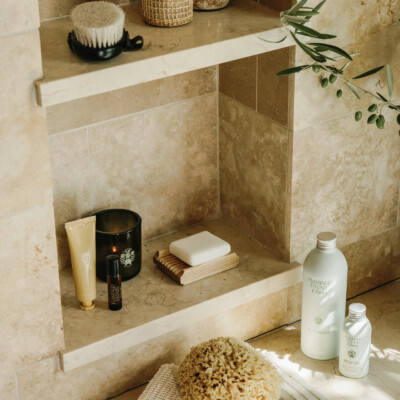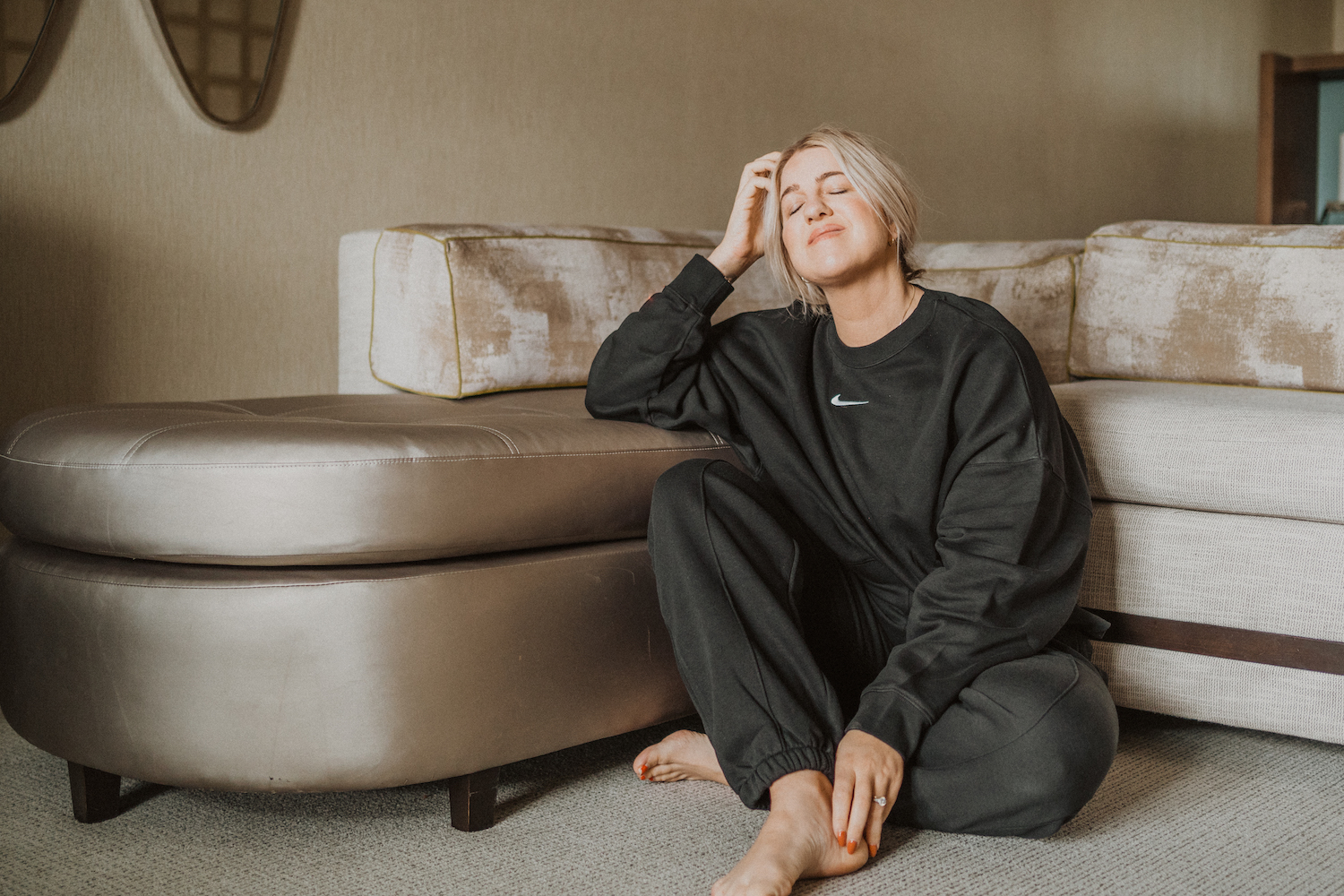Keeping it real—I wish I was someone who loved summer. Growing up, I vacationed in New Hampshire and looked forward to funnel cake on the boardwalk, lazy days on the lake, sugary cereal, and a late bedtime. But now? I feel pressure to pack my social calendar, live my best life (in comparison to social media), and look hot while doing it. Not in the literal sense, because there is a permanent pool of sweat on my upper lip that I just wish wasn’t there. Ugh. I never realized that seasonal depression is just as valid now as it can be in colder months.
Seasonal Affective Disorder (or SAD for short) is often associated with winter, but for many, summer seasonal depression is very real. If you find yourself not enjoying activities you normally do and in just a general crummy mood that you can’t shake once the weather heats up, you’re not alone. Ahead, I chatted with psychologist Dr. Hannah Holmes to get her take on summer SAD, plus practical advice for combatting the seasonal blues.

How do I know I have Summer SAD?
If you look around and see others enjoying the season while you’re barely making it through, you may be experiencing summer seasonal depression. “As days get warmer and longer, many people feel a renewed sense of energy and optimism,” Dr. Holmes shares. “For a person with summer SAD, this contrasts sharply with their own low mood and lack of energy.”
Summer SAD can also be an isolated experience, which can make it even more difficult to cope. “People often discuss how important it is to make the best of cold winter days, such as leaning into winter sports or savoring cozy, indoor activities—yet we assume that this comes easily and naturally in the summer,” she explains. If you’re feeling low, the name of the game is to treat yourself with extra care, grace and kindness this summer.
Here are other symptoms of summer SAD, according to the Center for Addiction and Mental Health.
• Sad and low mood
• Feeling anxious
• Feeling agitated
• Reduced appetite
• Weight loss
• Difficulty sleeping and insomnia


How to Combat Summer Seasonal Depression
If you find yourself feeling anxious, drained, and low this season, you’ve come to the right place. Here are Dr. Holmes’ tips for getting through the season gently.
Curate Your Social Media
As they say, comparison is the thief of joy. It can be so easy to get sucked into a social media scroll and start comparing your season to others. “Remember that you may be imagining other people’s summers to be much more blissful or exciting than they really are,” Dr. Holmes says. “When you see pictures of a friend’s vacation on social media, remember that they are sharing a curated set of images meant to show the best moments of their trip.”
It’s a timely reminder. Social media is a highlight reel, especially when it comes to travel or vacation content. “The photos don’t capture behind-the-scenes jet lag, travel hiccups, or the hundreds of emails they had to deal with after their trip,” Dr. Holmes continues. To keep comparison at bay, curate your feed so you’re only seeing content that uplifts you, and limit your scrolling time if you can. “Scrolling social media is a passive, sedentary activity. Try to replace scrolling with something tactile, like drawing, organizing a drawer, or stretching,” Dr. Holmes recommends. “Take a walk and listen to an interesting or inspiring podcast. These active, physical experiences are grounding and energizing.”
Focus on What Your Body Can Do
“Warm weather and summer activities means more skin-baring clothes, like shorts and swimsuits, which can be intimidating for anyone who already struggles with body image issues,” Dr. Holmes shares. I know for me, body shaming gremlins run rampant in my mind once it gets hot outside.
“During this vulnerable season, be especially thoughtful about the content you consume,” Dr. Holmes suggests. “Follow body-positive social media accounts, and limit exposure to content that brings up negative feelings about your body.”
Shifting your focus away from what your body looks like can also be helpful. “Focus on what your body can do and feel,” Dr. Holmes urges. “Practice gratitude for the way your body supports you.”
Dress Comfortably
If you struggle with body image, it can be a challenge getting dressed every morning when the weather is hot. Dr. Holmes suggests practicing bravery and acknowledging your courage. “If summer attire makes you want to hide your body or withdraw from social activities, make it a priority to gently challenge your fears and take small risks, so you can build your confidence over time,” Dr. Holmes suggests.
See if you can find at least one summer outfit you feel confident and comfortable in, and let that be your summer uniform. It will take the guesswork out of getting ready, and lower your stress in the process.


Stay Cool
In a season defined by heat, it’s so important to stay cool. This isn’t just for your physical health, but for your mental health as well. “We know that heat and humidity can cause irritability and frustration,” Dr. Holmes shares. “If you find yourself struggling with summer weather, be deliberate about making the best of the sunshine and heat and staying cool while you do it.”
If this means that outdoor activities make you want to run for the hills, make peace with being an indoor cat for the season. “Prioritize activities that allow you to cool off like the beach or the pool, or skip going outside altogether,” Dr. Holmes suggests. “Simply enjoy doing indoor, air-conditioned activities.”
There are plenty of indoor activities you can do this summer, and there’s no need to beat yourself up for skipping the outdoors. I’ve been loving cozy hobbies like paint by number, reading, and sewing. All in the AC!
Travel Mindfully
Even if you have a vacay in the books this summer, it’s ok (and normal!) to feel overwhelmed and anxious by it. Dr. Holmes suggests giving yourself ample time to recharge after a vacation. “Vacations are fun, but they are not necessarily stress-free; they disrupt your normal routine, which can throw off your equilibrium and affect your mood,” she says.
If you’re able, ease into your vacation, then ease out of it. “If you know your mood dips in the summer, be thoughtful about giving yourself time to adjust and recalibrate after travel or other activities that disrupt your typical routine,” Dr. Holmes says.
While summer is often painted as a season of ease and joy, it’s important to remember that not everyone feels their best during the warmer months. If you’re struggling with summer seasonal depression, know that you’re not alone and that your experience is valid. By protecting your peace and prioritizing rest, it’s possible to find your own version of summer that feels grounded, nourishing, and true to you. Just remember to take good care—and know that fall is right around the corner.






